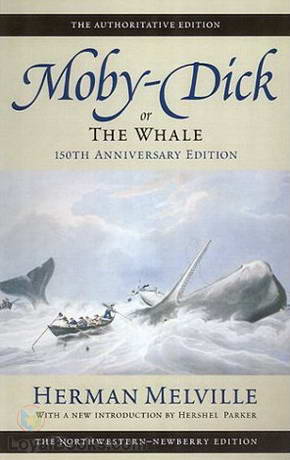
“Call me Ishmael” is one of the most famous opening lines in American literature. With these words, opens one of the strangest and most gripping stories ever written about the sea and sea-faring. Moby Dick by Herman Melville is today considered one of the greatest novels written in America but paradoxically, it was a miserable failure when it first made its debut in 1851. Entitled Moby Dick or The Whale the book finally got its due after the author’s death and is now regarded as a classic portrayal of mania and fatal obsession.
The narrator, Ishmael, travels to New Bedford, Massachusetts, to find a place on a whaling ship. He lodges at a seedy inn where he is forced to share a room with a strange old character, Queequeg, who was a harpooner. Despite his initial revulsion of Queequeg, Ishmael decides to join him in looking for work together. They reach Nantucket, the traditional center of whaling, where they find a berth on the Pequod, a bizarre vessel adorned with the skeletons and teeth of whales. The captain, Ahab, a mysterious figure, does not appear immediately. Later, they come to know that he is on board, recovering from losing a leg on his last voyage having escaped death narrowly following an encounter with a massive sperm whale.
As the ship sails past Africa, Ahab’s sinister motives begin to emerge. His agenda is to hunt and destroy a legendary whale named Moby Dick, whom he has unsuccessfully pursued several times. He has smuggled his own private harpooners on board and he accosts every whaling ship he meets and demands information about sightings of Moby Dick. One of the ships has a maniacal passenger called Gabriel, who claims to be a prophet and he predicts doom for anyone who seeks Moby Dick. The peg leg captain finally encounters Moby Dick and a trail of destruction follows. The obsessed Ahab refuses to give up. The novel then races towards a brilliant and dramatic climax.
As an example of the Great American Novel, Moby Dick is unrivaled in its structure, language and style. Melville amalgamates a fabulous mix of Biblical, Shakespearean and mythical elements along with wonderful seafaring atmosphere sourced from his own nautical experiences on board whaling schooners. Whaling stories from contemporary sources in Nantucket’s local grapevine was another rich fountainhead of material.
Moby Dick has been adapted for stage, radio, screen, television, comics and graphic novels. It remains a strange and unforgettable classic which no reader should miss.

Other Audiobook
Audiobook: Alraune
Ein Professor, der gemeinsam mit seinem Assistenzarzt ein medizinisches Versuchslabor betreibt. Eine Zeugung ohne Geschlechtsakt
Audiobook: Lear of the Steppes, etc.
This book contains three novellas by one of the major writers of Russian literature. The
Audiobook: Travels in the Interior of Africa
Mungo Park, a Scottish surgeon and explorer, was sent out by the ‘Association for Promoting
Audiobook: Jacob Faithful
Rebelling against the career chosen for him by his wealthy family, Frederic Marryat joined the
Audiobook: LibriVox 12th Anniversary Collection
“LibriVox is a hope, an experiment, and a question: can the net harness a bunch
Audiobook: God, the Invisible King
Wells wrote in his book God the Invisible King that his idea of God did
Audiobook: Love for Love
“We have such a gallery, if not of great characters, at any rate of strongly-marked
Audiobook: Book of Dreams and Ghosts
The Book of Dreams and Ghosts by Andrew Lang is a book mainly focused on
Audiobook: Multilingual Poetry Collection 013
In LibriVox’s Multilingual Poetry Collection, LibriVox volunteers read their favourite public-domain poems in languages other
Audiobook: The Elements of Style
The Elements of Style (1918) by William Strunk, Jr. is an American English writing style
Audiobook: Birds and All Nature, Vol. V, No 5, May 1899
“Birds and All Nature” was a monthly publication of the Nature Study Publishing Company of
Audiobook: Nye and Riley’s Wit and Humor
“What this country needs, aside from a new Indian policy and a style of poison